You can now add Healthify as a preferred source on Google. Click here to see us when you search Google.
Foetal anticonvulsant syndrome prevention
Key points about foetal anticonvulsant syndrome (FACS) prevention
- Foetal anticonvulsant syndrome is a group of characteristics that can affect some babies if they're exposed to antiepileptic drugs (AEDs) while in the womb.
- Children with FACS may have physical, developmental or cognitive impairments.
- Some AEDs carry a greater risk than others, especially sodium valproate (Epilim®) and topiramate.
- If you’re taking anti-seizure/mood stabilising medicine and are planning a pregnancy, talk to your healthcare provider about it.
- If you discover you’re pregnant, don’t stop taking your anti-seizure/mood stabilising medication but talk to your healthcare provider urgently.

Foetal anticonvulsant syndrome (FACS) is a group of impairments that may affect some babies if they’re exposed to certain anti-seizure/mood stabilising medications while in the womb (during pregnancy). Babies and children with FACS may have physical malformations (eg, spina bifida, cleft palate, or heart defects) as well as developmental or cognitive impairments including learning problems and autism spectrum disorder. Read more about FACS.
There are risks of malformations (abnormal physical development of part of the body) in every pregnancy. However, these risks are higher:
- if the pregnant person is taking more than 1 AED or high doses
- and higher again if the baby has been exposed to sodium valproate (Epilim) or topiramate – some anti-seizure/mood stabilising medications have fewer risks.
You can read more about the specific risks on the ACC website(external link) and on the epilepsy and pregnancy page – discuss these risks with your healthcare provider. It’s important to remember that most pregnant people taking anti-seizure medication will have a healthy child.
At every stage of your pregnancy, including the planning, talk to your healthcare provider so you can work out a plan to manage your epilepsy and your pregnancy. Make sure you have all the information you need to make decisions to keep you and your baby safe.

Image credit: Healthify He Puna Waiora. Content adapted from ACC, NZ
I want to get pregnant
Don't stop taking your medication or make changes to your medication
Stopping your anti-seizure/mood stabilising medication increases your risk of having seizures, which is even more harmful for you and your baby. Instead, talk to your healthcare provider at least 6 months before you want to start trying to get pregnant. This is because it takes time to safely change your medicines and some of the problems that can happen to your baby happen in the very early weeks of your pregnancy.
Talk to your healthcare provider as soon as you start thinking you want to get pregnant. It may be possible to reduce the dose of your antiepileptic medicine. If you’re taking anti-seizure/mood stabilising medication because you have epilepsy, you may be able to change to a different type so there’s less risk of harm to your baby. If you’re taking medicine for headache, pain or to keep your moods regulated, you may be able to stop or change your medicine so there’s less risk of harm to your baby.
Your healthcare provider will also talk to you about taking folic acid (5 mg) every day. This will help reduce the risk of your baby having neural tube defects, such as spina bifida. Read more about folic acid.
I am pregnant or think I am pregnant
Keep taking your medicine at the right dose. Contact your healthcare provider, tell them you think you’re pregnant and get an urgent appointment to see them.
If you have epilepsy and stop taking your medicine or change the dose you could have very bad seizures. These seizures could cause a miscarriage and put your own life at risk. Read more about epilepsy and pregnancy. If you’re taking medicine for mood regulation and stop taking your medicine or change the dose, you could have severe mood changes that could put you at risk. If you're taking medicine for pain and stop taking your medicine, your pain could return.
If you are less than 12 weeks pregnant your healthcare provider will recommend that you take 5 milligrams of folic acid every day. This will reduce the risk of your baby having neural tube defects such as spina bifida. Read more about folic acid.
I don’t want to get pregnant
Use 2 forms of contraception to avoid an unplanned pregnancy when you’re taking anti-seizure medication. Some methods of contraception may be less effective in preventing pregnancy for people taking certain anti-seizure medications.
If you have a uterus and you’re sexually active and taking sodium valproate (Epilim) or topiramate, you should use 2 effective means of contraception to avoid unplanned pregnancy. For example, consider long-acting reversible contraceptives, (eg, the Depo Provera injection or an IUD – Mirena or coil) plus condoms. When you’re taking valproate or topiramate it’s extremely important to plan for your pregnancy well in advance. You need to see your healthcare provider 6 to 12 months before you would like to become pregnant – it takes time to safely change your medicines. You and your healthcare provider will agree on a plan about how to manage your medicines and your dose. Read more about contraception and epilepsy and contraception.
Women who are taking antiepileptic drugs are often worried about the effect on motherhood of the condition, such as epilepsy, and its treatment. This includes fear of potential harm to your baby or not being able to fulfil the role of being a mother as you would want. Talk to your healthcare provider about your concerns at every stage of your pregnancy, including the planning stage. Make sure you have all the information you need to make decisions to keep your baby and yourself as safe as possible. See pre-pregnancy conversation starters(external link).
Video: It's important you have all the facts – understanding your medicines
See your healthcare provider who can talk to you and refer your baby to a specialist if it’s needed. Read more about FACS and the support available for you and your tamariki.
Foetal anti-seizure syndrome New Zealand(external link) FACSNZ
Brochures
Medicines for epilepsy, mental health and pain can harm your unborn baby(external link) ACC, NZ
References
- Medicines for epilepsy, mental health and pain can harm your unborn baby(external link) ACC, NZ, 2020
- Fetal anticonvulsant syndrome(external link) Patient Info Pro, UK, 2023
Credits: Healthify editorial team. Healthify is brought to you by Health Navigator Charitable Trust.
Reviewed by: Dr Suzanne Davis, Paediatric Neurologist, Auckland
Last reviewed:
Page last updated:





